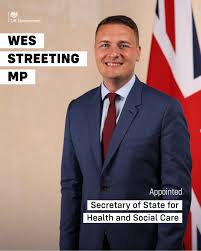Wes Streeting: A Rising Star in Labour Politics

Introduction
Wes Streeting, the Member of Parliament for Ilford North, has emerged as a significant political figure in the UK Labour Party. His influence has grown notably within the party, especially in light of recent elections and the ongoing evolution of national health policies. Understanding Streeting’s role provides insight into the future direction of Labour and its approach to pressing issues affecting the United Kingdom.
Background and Political Career
Born on 24th March 1983, Streeting was educated at Cambridge University, where he studied History. He has been a vocal advocate for progressive policies since entering Parliament in the 2015 general election. As a member of the shadow cabinet, Streeting holds the position of Shadow Secretary of State for Health and Social Care. His responsibilities include critiquing government health policies and shaping Labour’s health agenda, particularly in the wake of the COVID-19 pandemic, which has substantially changed the landscape of healthcare in the UK.
Recent Developments
Streeting has been at the forefront of discussions surrounding NHS funding and reform. His recent statements have highlighted the need for increased investment in healthcare and a more robust strategy to tackle waiting times and access to services. In August 2023, during a speech addressing party members, he emphasised that Labour’s commitment to restoring the NHS must be a priority. This aligns with public sentiment, as recent polls indicate that healthcare is one of the top concerns for voters ahead of the upcoming general election.
Public Perception and Criticism
While Streeting enjoys considerable support within the party, he has faced criticism from some factions who argue that his positions lean more towards centrism than the traditional left-wing values of the Labour Party. This ideological tension illustrates the broader struggle within Labour as it seeks to unite diverse viewpoints ahead of the next election. However, Streeting’s ability to engage with both moderate and progressive elements of the party may be crucial in ensuring Labour’s success at the polls.
Conclusion
As Labour navigates the complexities of contemporary British politics, Wes Streeting’s role will likely become increasingly pivotal. His focus on health reform and NHS issues resonates with a critical voter demographic, suggesting that his influence could shape the party’s policies in the lead-up to the election. Whether Streeting can successfully balance the demands of varied party factions will be significant for Labour’s prospects. For readers, following Streeting’s developments may offer vital clues about Labour’s strategy and future direction, as the party positions itself for one of its most important electoral contests in recent history.









